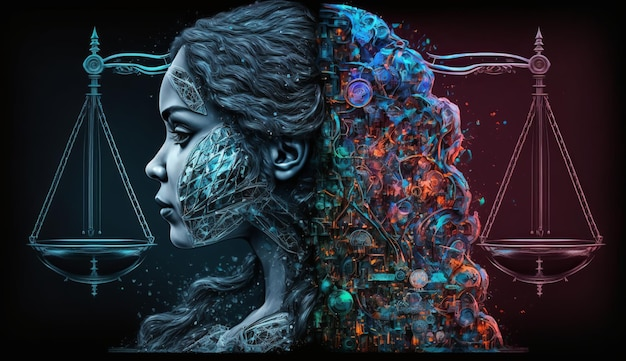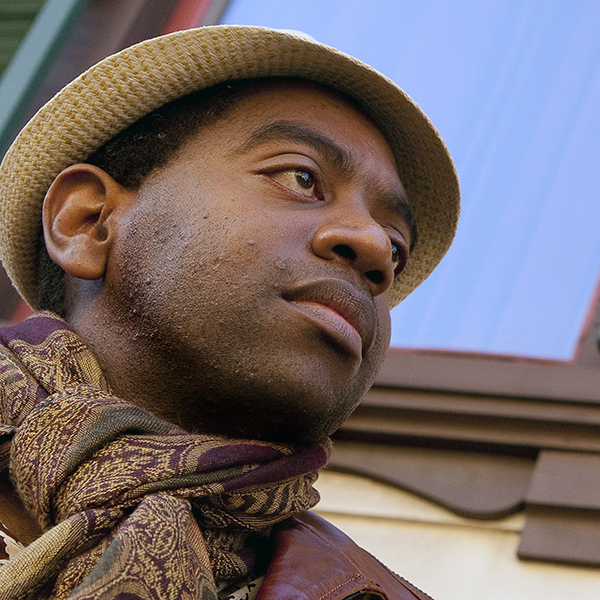AI and social justice are increasingly intertwined in today’s technological discourse, prompting urgent discussions about the ethical implications of artificial intelligence in society. As we advance into the future of AI, scholars like Ruha Benjamin emphasize the necessity of incorporating social justice in technology to ensure that new innovations serve all communities equitably. Unfortunately, many AI systems currently reinforce existing inequalities, rather than alleviating them; this paradox raises critical questions about AI ethics. Benjamin advocates for a broader imagination in tech, one that transcends traditional narratives of efficiency and progress, urging us to envision inclusive futures. By fostering an environment that values both technical and social knowledge, we can steer AI development towards a more just and equitable direction.
The intersection of artificial intelligence and equity is a critical area of exploration as we navigate contemporary technological landscapes. Pioneering voices like Ruha Benjamin stress the importance of integrating principles of fairness within technological advancements, which has led to a heightened focus on equity in AI applications. Often, discussions around the innovations in AI overlook the necessity for social responsibility, leading to potential harms for marginalized groups. Benjamin’s call for imaginative approaches in tech encourages a shift from merely refining algorithms to envisioning a tech landscape that champions accessibility and justice for all. By embracing this broader perspective, we can ensure that future advancements are not just sophisticated, but also serve the collective good of humanity.
Envisioning a Just Future with AI
As technology advances, the potential for artificial intelligence (AI) to shape our future becomes increasingly apparent. Ruha Benjamin argues that rather than succumbing to a dystopian outlook, society should harness the power of imagination to envision a future driven by social justice principles. In her discussions, she critiques the narratives often put forth by tech elites, suggesting that their visions tend to overlook the needs of marginalized communities. By prioritizing ethical considerations in AI development, we can create systems that truly serve the public good rather than perpetuate existing inequities.
Benjamin’s perspective illuminates the importance of integrating diverse voices in the discourse surrounding AI. As scholars and practitioners in the field of AI ethics advocate for more equitable tech solutions, it becomes crucial to challenge the validity of tech-driven futures that fail to account for social justice. The future of AI should not only be about enhanced efficiency or profit maximization but also about creating opportunities for all societal segments. By focusing on these ideals, we pave the way for innovations that foster inclusion and dismantle systemic barriers.
Critical Perspectives on AI and Social Justice
The discourse surrounding AI technology is complex, particularly when considering its implications for social justice. Ruha Benjamin’s insights reveal that the narratives surrounding AI often mask underlying motives of profit and control, rather than fostering genuine altruism. As she highlights, AI tools like facial recognition and automated decision-making algorithms can inadvertently exacerbate discrimination and injustice. Such technologies, praised for their efficiency, can lead to detrimental outcomes, particularly for marginalized groups who bear the brunt of these flawed systems.
In reimagining AI’s role in society, it is essential to scrutinize how these technologies are designed and implemented. Benjamin encourages a shift in focus from mere technical proficiency to a broader understanding of societal needs and the historical context in which these technologies operate. Addressing the call for AI ethics involves not only adjusting current methodologies but also radically rethinking the foundations of our technological aspirations. By doing so, we can cultivate an environment where creativity and imagination are pivotal in developing responsibly constructed technologies that uplift, rather than diminish, communal welfare.
Rethinking Technology through Arts and Humanities
Ruha Benjamin advocates for a closer alignment between creative disciplines and technological innovation, arguing that the arts and humanities have critical roles in shaping our technological futures. By fostering inquiry through these fields, we can encourage the development of AI systems that are deeply informed by societal contexts and historical injustices. This interdisciplinary approach could lead to innovations that not only address technical challenges but also engage with critical ethical considerations integral to AI deployment.
Integrating the perspectives of the arts and humanities into tech discourse can significantly enhance our capacity to imagine radical alternatives to current AI practices. Benjamin’s call to dismantle mental barriers and the conventional views of progress challenges us to redefine what is possible. For example, instead of conceiving of advanced AI merely as a tool for surveillance or control, we can view it as an opportunity to cultivate community, connection, and equitable access to resources. Through this lens, we can begin to envision a future where technological advancements align more closely with the principles of social justice.
The Role of Imagination in Tech Innovation
Imagination is a powerful tool in the realm of technology and AI. Ruha Benjamin insists that the capacity to envision an alternative future substantially influences the innovations we pursue and implement. The prevalent narratives often rooted in profit-driven motives limit our ability to see the broader impacts of these innovations on society. She urges us to cultivate a mindset that is not only critical of existing systems but is also imaginative in proposing new, more equitable models for technological development.
The future of AI technologies should be envisioned beyond the constraints set by the status quo. By advocating for creative and progressive thinking, we can re-imagine not only how AI works but also who it serves. Benjamin emphasizes the responsibility of all stakeholders involved in technology to contribute to a collective imagination that prioritizes justice, equity, and well-being for all individuals. This shift towards radical imagination can drive the transformative changes necessary for a more humane and just tech landscape.
Challenging Tech Elites’ Narratives on AI
Ruha Benjamin critiques the narratives propagated by tech elites, urging society to question the altruism that these leaders ascribe to their vision of an AI-powered future. Often, these narratives serve the interests of the powerful while neglecting the voices of marginalized communities. By challenging these discourses, we foster a healthier dialogue around the implications of AI technologies and their supposed benefits. This critical inspection is necessary to unveil the underlying motivations that may lead to ethical dilemmas and inequities in technological advancement.
Moreover, Benjamin’s insights provoke us to reconsider who gets to shape the future of AI. It is vital for society to engage a broader array of perspectives to build systems that not only emphasize progress but are also reflective of diverse experiences. By advocating for inclusivity in technological discussions, we can help ensure that future AI developments prioritize social equity and justice rather than reinforcing existing power imbalances.
Exploring the Connection Between AI and Eugenics
One of the more profound insights offered by Ruha Benjamin is the unsettling parallel drawn between modern AI technologies and the historical trajectory of eugenics. She articulates that algorithms, while often seen as neutral, can reproduce and perpetuate biases that echo sentiments from the past. Technologies designed without consideration for social implications can thus mirror harmful practices that have identified and targeted marginalized groups throughout history, raising fundamental ethical questions about their application and impact.
Understanding this connection mandates a critical look at how decisions embedded in AI systems affect human lives directly, underlining the importance of AI ethics as a vital field of study. Engaging with the historical context of these technologies provides an essential backdrop for current debates on fairness and justice. Benjamin’s argument thus encourages us to take a more holistic approach, considering not just the technical specifications of AI, but also its ethical and societal ramifications.
The Call for Responsible AI Design
A central theme in Ruha Benjamin’s discourse is the urgent need for responsible AI design that emphasizes ethical considerations. As AI continues to integrate into various sectors, it is imperative that developers prioritize the implications of their technologies on society. Benjamin stresses that responsibility goes beyond mere compliance with regulations; it calls for a radical shift in how we conceptualize AI systems, ensuring they serve the genuine needs of communities rather than reinforcing existing disparities.
In this quest for responsible design, it is crucial to incorporate diverse viewpoints into the development process. This includes engaging with social scientists, ethicists, and communities affected by these technologies to ensure that the innovations fostered are not just efficient but equitable. By fostering collaborative relationships across disciplines, the design of AI systems can genuinely reflect community needs and aspirations, creating technologies that enhance societal welfare rather than diminish it.
Imagining Alternatives: Beyond Surveillance and Control
Ruha Benjamin’s call to reimagine AI goes hand in hand with the need to envision alternatives to current models of surveillance and control that dominate technological innovation today. The potential for AI to be used not just for monitoring but for empowerment exists, yet it requires a creative and thoughtful approach that prioritizes human rights and social equity. Instead of defaulting to methods that reinforce dominance, we must envision systems that enhance community resilience and support collaborative governance.
By fostering a culture that values imagination as a precursor to innovation, we open pathways to explore technologies that can dismantle oppressive structures and bring about positive societal change. This transformative vision extends to all sectors where AI is poised to play a role, challenging us to rethink our definitions of progress and efficiency. The development of such creative alternatives relies on the collective engagement of technologists, policymakers, and community members who are willing to imagine a world characterized by cooperation rather than competition.
Integrating Social Justice in Technology
Benjamin emphasizes the importance of integrating social justice into the fabric of technological innovation. As AI technologies evolve, the question arises: who benefits from these advancements? Without intentional focus on equity and justice, the risk of exacerbating existing societal inequalities remains high. Technology should be a means of empowerment and inclusivity rather than a vessel for further oppression. This perspective aligns with broader discussions about the role of ethics in AI, highlighting the need for critical reflection on how technologies are developed and deployed.
Creative engagement with these issues can lead to innovations that reflect a commitment to social justice. This entails a conscientious effort to involve diverse stakeholders—particularly those from marginalized communities—in the design processes. By doing so, we can work toward AI solutions that are representative and equitable, striving to dismantle systemic inequities perpetuated by technological infrastructure. This integration of social justice in the tech landscape is not just necessary; it is imperative for a just future.
Frequently Asked Questions
How does AI intersect with social justice in technology?
AI intersects with social justice in technology by highlighting the disparities in who benefits from advancements in artificial intelligence. As Ruha Benjamin argues, AI systems often perpetuate existing biases and injustices, impacting marginalized communities through tools like facial recognition and healthcare triage systems. Addressing these issues requires a focus on ethical AI practices that prioritize equity and inclusion.
What insights does Ruha Benjamin provide about the future of AI and social justice?
Ruha Benjamin emphasizes that the future of AI does not have to be dystopian but can instead be a platform for social justice. She critiques the notion that tech elites have the answers to societal problems, advocating for a diverse dialogue that includes voices from the arts and humanities. This inclusive approach is vital for reimagining an equitable future for all.
Why is imagination in tech important for achieving social justice in AI?
Imagination in tech is crucial for social justice in AI because it encourages innovation beyond the status quo. Ruha Benjamin calls for a creative rethinking of AI systems that challenges traditional narratives prioritizing efficiency over humanity. By fostering a culture of creativity, we can envision solutions that dismantle oppressive structures and build a fairer society.
What are some ethical considerations in AI according to experts like Ruha Benjamin?
Experts like Ruha Benjamin advocate for several ethical considerations in AI, including the recognition of biases in algorithms, the potential for AI to exacerbate inequality, and the importance of incorporating social perspectives into technological developments. Ethical AI must prioritize human well-being and aim to reduce harm, particularly for marginalized groups.
How can universities contribute to social justice in AI according to Ruha Benjamin’s perspective?
According to Ruha Benjamin, universities can contribute to social justice in AI by fostering interdisciplinary collaboration that includes arts and humanities. By prioritizing critical inquiry and creativity, academic institutions can equip students with the tools to challenge existing power dynamics and reimagine technology in a way that serves the collective good.
What role does AI ethics play in shaping a just future?
AI ethics plays a crucial role in shaping a just future by guiding the development and deployment of AI technologies in ways that prioritize fairness, accountability, and transparency. Experts like Ruha Benjamin argue that without a strong ethical framework, AI risks perpetuating discrimination and inequality, underscoring the need for ethical considerations in technological innovation.
What are the risks of viewing AI as a neutral technology in social justice?
Viewing AI as a neutral technology poses significant risks in social justice, as it can mask the biases inherent in algorithmic decision-making. Ruha Benjamin points out that this perception can lead to the perpetuation of harmful practices, where marginalized groups continue to suffer from systems designed without their needs in mind. A critical examination of AI is necessary to ensure it serves all members of society equitably.
| Key Points |
|---|
| Ruha Benjamin argues for a hopeful future rather than a dystopian one, asking citizens to envision radical changes in society. |
| Technology leaders’ visions often prioritize self-interest instead of collective well-being, making them unreliable guardians of social progress. |
| AI technologies can perpetuate oppression instead of alleviating suffering, with example failures such as biased facial recognition. |
| AI decision-making based solely on algorithms can harm marginalized communities, mirroring the injustices of historical eugenics. |
| Benjamin emphasizes the need to include diverse perspectives in tech development, not just technical expertise. |
| There is a call for greater focus on creativity and the arts to rethink societal structures and challenges. |
| Benjamin invites us to imagine a world beyond traditional social constraints, encouraging critical and creative thinking. |
Summary
AI and Social Justice are increasingly intertwined as we confront the implications of technology on our social fabric. Ruha Benjamin challenges the dominant narratives around AI by asserting that we must not only critique existing systems but also strive to envision radically just alternatives. She highlights how tech solutions often reflect the biases of their creators, exacerbating issues faced by marginalized groups. In advocating for increased creativity and the inclusion of diverse perspectives, Benjamin paves the way for a more equitable future where AI serves humanity rather than perpetuating oppression. By fostering imaginative thinking, we can dismantle oppressive structures and reimagine a society that honors justice and equality for all.



MOST COMMENTED
Culture News
Katie Kitamura: Exploring Horror in Midlife Fiction
Culture News
Canine Empathy Research: Insights from Harvard Experts
Culture News
Introductory Humanities Courses: Engaging First-Year Students
Culture News
Canine Research: Exploring the Human-Dog Connection
Culture News
Introductory Humanities Courses Engaging First-Year Students
Culture News
Afro-Cuban Music: Yosvany Terry’s Cultural Explorations
Culture News
Artificial Intelligence in Photojournalism: A New Hope